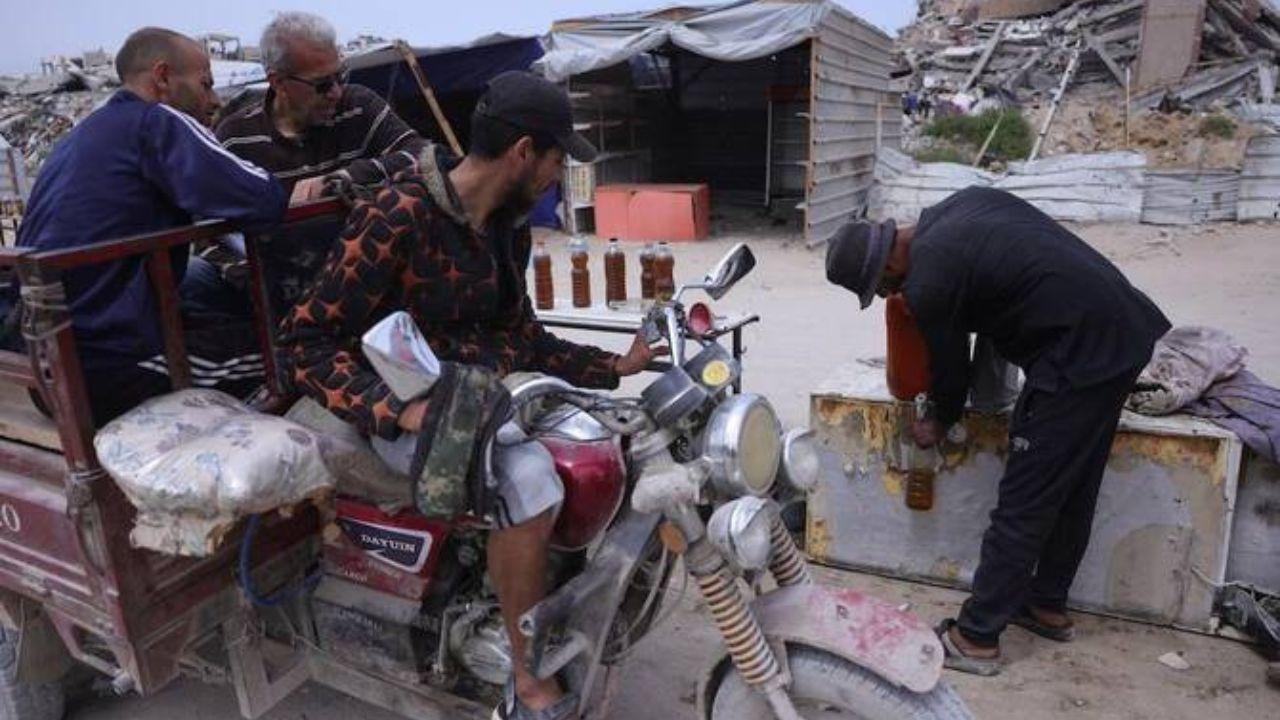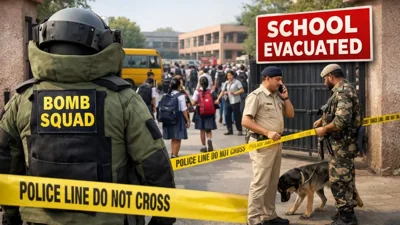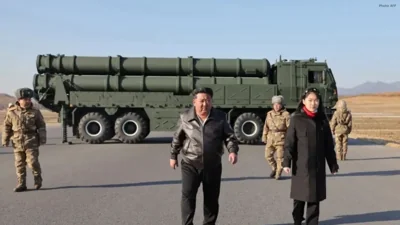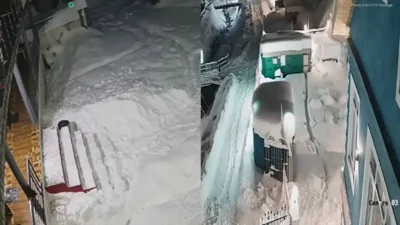
Post by : Priya
Photo:AFP
A Humanitarian Emergency in the Making
The Gaza Strip is facing one of its most severe humanitarian crises in recent memory. Fuel supplies, the backbone of many essential services, have dropped to dangerously low levels. This shortage is not just affecting transportation — it is threatening hospitals, clean water systems, food storage, and emergency response services. With border crossings largely closed and aid unable to enter freely, the situation is becoming more critical by the day.
The entire population of Gaza — over two million people — is being pushed to the edge. The crisis does not only highlight the vulnerability of a population under blockade, but it also calls attention to the devastating consequences when politics obstruct basic human needs. If fuel is not delivered immediately, thousands of innocent lives could be lost due to preventable causes.
How the Fuel Crisis Began
The fuel shortage in Gaza is the result of multiple, overlapping factors. Primarily, it is linked to the closure of border crossings between Gaza and both Israel and Egypt. These crossings are the only way for fuel, food, medicine, and humanitarian aid to enter the Strip.
Over the last few months, these borders have remained mostly shut due to increased military tension in the region. With each passing day, trucks carrying diesel and gasoline have been stuck on the other side, unable to deliver their life-saving cargo.
Meanwhile, Gaza has no oil refineries of its own. It depends entirely on outside sources for energy. The power plants in the region, which run on fuel, have cut back their output. This has left large parts of Gaza with less than four hours of electricity per day — and in some places, no power at all.
Hospitals Are Struggling to Stay Open
Perhaps the most tragic consequence of the fuel shortage is its effect on the healthcare system. Hospitals and clinics throughout Gaza rely on generators to function. Without fuel, life-saving equipment such as ventilators, dialysis machines, and surgical tools cannot be operated.
Health officials in Gaza have reported that their fuel reserves are nearly depleted. As a result, some hospitals have already started shutting down parts of their operations. Surgeries are being delayed, maternity wards are understaffed, and patients in intensive care are at risk.
Dr. Rami al-Kurdi, a senior physician at al-Shifa Hospital, the largest in Gaza, said,
“We have children in incubators, patients who need dialysis, and others who cannot survive without electricity. If fuel does not arrive soon, we will start losing lives — one by one.”
Already, smaller clinics in northern and southern Gaza have closed entirely due to lack of power. Medical staff are working without proper lighting or air conditioning, and some doctors have been seen using mobile phone flashlights to treat patients.
Water Systems Are Also Breaking Down
Fuel powers the water pumps and sanitation systems that deliver clean water to homes and hospitals across Gaza. Without it, millions are at risk of losing access to safe drinking water. Humanitarian organizations have reported that water supplies are already dropping in many neighborhoods.
Sewage systems, too, require power to function. Without fuel, untreated sewage could start overflowing into streets, spreading disease and contaminating the little clean water that remains. Such unsanitary conditions could cause outbreaks of waterborne illnesses, especially among children and the elderly.
The World Health Organization has warned of an “imminent health catastrophe” if Gaza’s water and sanitation services collapse completely.
Ambulance and Emergency Services Nearly Paralyzed
Emergency services are also being hit hard. Gaza’s ambulance system is already stretched thin, but now, with fuel supplies running out, even fewer vehicles are available to respond to emergencies.
In many areas, ambulances are only being dispatched for the most urgent cases. This means patients suffering from heart attacks, strokes, or injuries from recent bombings are not being reached in time.
Ali Hamad, a volunteer ambulance driver in Khan Younis, said,
“We often get calls, but we have to ask — do we have enough fuel to make the trip? Sometimes, we have to say no. It breaks our hearts.”
Fire departments and civil defense units are also being limited in their work. Without fuel, they cannot respond effectively to house fires or building collapses — events that are not uncommon in a densely populated area like Gaza.
Impact on Food Storage and Supply Chains
Fuel is essential for preserving food and transporting supplies across Gaza. Cold storage facilities, bakeries, and food trucks all depend on power and fuel. Without it, there is a growing risk that food will spoil, leading to shortages and hunger.
Already, the prices of basic food items like bread, milk, and vegetables have risen. Markets have fewer goods to sell, and many families can no longer afford even the most basic meals.
The UN Relief and Works Agency (UNRWA) has warned that the worsening fuel crisis could soon lead to widespread hunger, especially in refugee camps where people are already living in extreme poverty.
Education and Daily Life at a Standstill
Schools, offices, and public services in Gaza are also affected by the lack of electricity and transportation. Without fuel, schools are unable to keep lights on or run computers. Children are missing classes, and exams have been postponed.
In homes, families are unable to cook meals, charge phones, or store food safely. Life has become a daily struggle for survival, with many people lining up for hours just to receive a few liters of drinking water or to charge their devices at public generators.
This complete breakdown of daily life has added to the mental stress and trauma that Gazans are already facing due to ongoing conflict and economic hardship.
Global Reactions and Calls for Action
The United Nations, Red Crescent, and several human rights groups have urgently called for fuel to be allowed into Gaza. They argue that denying fuel is the same as denying people the right to health, water, and life.
Despite these calls, political deadlock continues to delay any progress. While Israel and Egypt cite security concerns, humanitarian groups argue that fuel should not be a political tool.
A joint statement by more than 20 international NGOs said,
“Fuel is not a luxury. It is a basic need. Blocking fuel delivery in a crisis like this is inhumane.”
Several countries, including Norway, Ireland, and Turkey, have appealed to regional powers to open the borders at least for humanitarian supplies.
Voices from Gaza – Stories of Survival
In the streets of Gaza, the fuel crisis is more than just headlines. It’s a daily fight to survive.
Fatima, a mother of three in Rafah, says she walks three kilometers every day to fetch water for her children. Her husband, a taxi driver, has been out of work for two weeks due to fuel shortages.
“We don’t want anything luxurious,” she says. “We just want to live.”
Mahmoud, a 19-year-old university student, studies by candlelight. His dream of becoming a doctor feels more distant with each passing day.
“It feels like we are being forgotten by the world,” he says. “We are not asking for much — just light, water, and a chance.”










BTS Tour Sparks Global Demand: Mexico Appeals for Additional Shows
BTS' comeback tour creates immense demand in Mexico, prompting President Sheinbaum to urge more conc

Former First Lady Exonerated Amidst Martial Law Controversies
The former First Lady was found not guilty on key charges, but prosecutors intend to appeal as inves

Kim Jong Un Aims to Enhance North Korea’s Nuclear Capabilities
Kim Jong Un is preparing to unveil significant enhancements in North Korea's nuclear and missile sys

Rybakina and Pegula Reach Australian Open Semifinals Following Major Upsets
Rybakina upsets Swiatek; Pegula defeats Anisimova. Both advance to the Australian Open semifinals, a

Trump Appeals for Calm After Federal Shooting Incident in Minnesota
In response to the fatal shooting of two citizens by federal agents, President Trump calls for calm

Malaysian Football Association's Executive Resigns Amid FIFA Sanctions
The Football Association of Malaysia's leadership resigns following FIFA sanctions related to player